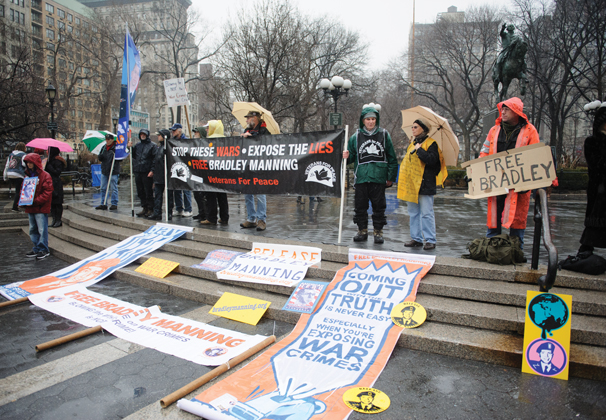
Heavy rain and wind pelted approximately 20 protesters as they huddled under the Union Square subway on Saturday to mark the 1,000th day of Bradley Manning’s imprisonment without trial.
Manning, a 24-year-old army intelligence analyst, was arrested in May 2010 for releasing information about U.S. actions in Iraq to WikiLeaks. He was kept in solitary confinement for 10 months, but then was moved to better conditions in April 2011 as a result of a public petition to President Obama. Though charged with 22 counts, including “aiding the enemy,” a capital crime, he remains untried.
“This has gone on far too long,” said Clark Stoekley, one of the organizers of the protest in Union Square.
The constitutional limit for detainment is 120 days without an arraignment, but Manning was held for 600. If this fact can be proven, the case will ultimately be dismissed. But according to Stoekley, this may be difficult because of unlawful command influence by Obama, who has stated that Manning broke the law.
Another lie, Stoekley said, is that Manning’s information leaks were a threat to national security.
“We have seen no proof of any harm done, no lives lost, just embarrassment mostly with our diplomacy,” he said.
He added that some good effects might have come from the release — namely, the end of the Iraq war and the intensification of the Arab Spring.
A large focus of the event was to show that Manning’s actions were heroic and not treacherous.
“Our contention, along with millions of people around the world, is that Bradley Manning is a hero for exposing what the [United States] has been up to in the global war on terror,” said Debra Sweet, the main event organizer. “He did a huge service … at a great personal risk.”
According to Sweet, the goal of the protest was to bring justice as well stopping the deception and war crimes of the U.S. government.
For Pamela Drew, a columnist and observer of the protest, events like these are paramount to highlighting issues of government secrecy.
“Public support is the most important element,” she said. “The only way we can have an impact is using our voices, and because the mainstream media does not cover [this issue], it is the only way we have to raise public awareness.”
On Tuesday in Fort Meade, Md., a judge will decide whether to dismiss the Manning case based on lack of speedy trial. If not dismissed, the trial is expected to start in June 2013.
“It needs to become the trial of the century,” Sweet said.
A version of this article was published in the Monday, Feb. 25 print edition. Veronica Carchedi is city/state editor. Email her at [email protected].






















































































































































